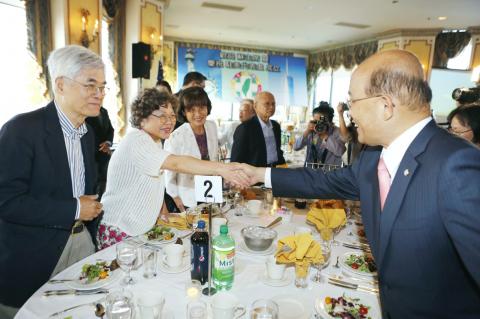The Democratic Progressive Party (DPP) will be pragmatic in handling domestic affairs and is capable of managing relations across the Taiwan Strait, DPP Chairman Su Tseng-chang (蘇貞昌) told Taiwanese-Americans in New York on Sunday, according to a DPP press release.
Su, who is visiting North America until Tuesday next week, also said in a speech at a dinner banquet that while some people are not happy with the nation’s current name, the Republic of China, as stipulated in the Constitution, “hopefully, someday we could engage the international community using the name Taiwan.”
Addressing domestic politics, Su said that the DPP has set high goals of winning a planned national referendum on the construction of the Fourth Nuclear Power Plant in Gongliao District (貢寮), New Taipei City (新北市), this year and the seven-in-one local elections next year, but the party would be patient and pragmatic in its policy formulation and would put forward concrete actions rather than offering lip services as the administration of President Ma Ying-jeou (馬英九) has done.

Photo: Chen Wei-min, Taipei Times
That is why the party has released a defense blue paper, a pension reform plan based on social equality and has organized a series of “open studio” forums on social and national affairs, Su added.
On external affairs, Su highlighted his initiative of a democratic alliance, which he said would consolidate international support for Taiwan, while balancing out Taiwan’s overdependence on China during Ma’s term.
However, the DPP is aware that the international community is watching if the party is capable of handling cross-strait relations, he said, adding that the DPP has been seeking further engagement with China — not only with Beijing, but also the Chinese people and its civil society.
Su elaborated on his recent comment in an interview, in which he was quoted as saying that working on Taiwanese independence would be “unnecessary” because Taiwan — unlike Xinjiang and Tibet — is a de facto independent and sovereign nation.
The DPP’s landmark Resolution on Taiwan’s Future, which was passed in 1999, defines Taiwan as a sovereign nation separate from China, while acknowledging the Republic of China as the country’s current formal title, he said.
“While some people are unhappy with it, it is the ‘status quo,’” Su said.
“We could change it by a democratic process [in the future], but we must accept the status quo before it is changed,” Su added.
The party’s latest survey showed that 55 percent of respondents supported Taiwanese independence, with the support rate among female respondents higher than that among men, said Wu Hsiang-jung (吳祥榮), director of the DPP’s poll center, who is accompanying Su on the trip.
Support for Taiwan’s independence has increased under Ma’s administration, as has the number of people who identify themselves as Taiwanese, at 75.6 percent, Wu said.
The DPP is cautiously optimistic about the major elections in the next three years as 41 percent of those polled said they would vote for DPP candidates in the seven-in-one elections next year against 23.9 percent who said they would favor Chinese Nationalist Party (KMT) candidates.
For the 2016 presidential election, 44.9 percent of respondents were in favor of the DPP, while 23.5 percent signaled support for the KMT, Wu said.
Su, who arrived in New York after his first stop in Los Angeles, is scheduled to visit Houston, Washington, Toronto and Vancouver before returning to Taiwan.

An essay competition jointly organized by a local writing society and a publisher affiliated with the Chinese Communist Party (CCP) might have contravened the Act Governing Relations Between the People of the Taiwan Area and the Mainland Area (臺灣地區與大陸地區人民關係條例), the Mainland Affairs Council (MAC) said on Thursday. “In this case, the partner organization is clearly an agency under the CCP’s Fujian Provincial Committee,” MAC Deputy Minister and spokesperson Liang Wen-chieh (梁文傑) said at a news briefing in Taipei. “It also involves bringing Taiwanese students to China with all-expenses-paid arrangements to attend award ceremonies and camps,” Liang said. Those two “characteristics” are typically sufficient

A magnitude 5.9 earthquake that struck about 33km off the coast of Hualien City was the "main shock" in a series of quakes in the area, with aftershocks expected over the next three days, the Central Weather Administration (CWA) said yesterday. Prior to the magnitude 5.9 quake shaking most of Taiwan at 6:53pm yesterday, six other earthquakes stronger than a magnitude of 4, starting with a magnitude 5.5 quake at 6:09pm, occurred in the area. CWA Seismological Center Director Wu Chien-fu (吳健富) confirmed that the quakes were all part of the same series and that the magnitude 5.5 temblor was

The brilliant blue waters, thick foliage and bucolic atmosphere on this seemingly idyllic archipelago deep in the Pacific Ocean belie the key role it now plays in a titanic geopolitical struggle. Palau is again on the front line as China, and the US and its allies prepare their forces in an intensifying contest for control over the Asia-Pacific region. The democratic nation of just 17,000 people hosts US-controlled airstrips and soon-to-be-completed radar installations that the US military describes as “critical” to monitoring vast swathes of water and airspace. It is also a key piece of the second island chain, a string of

The Central Weather Administration has issued a heat alert for southeastern Taiwan, warning of temperatures as high as 36°C today, while alerting some coastal areas of strong winds later in the day. Kaohsiung’s Neimen District (內門) and Pingtung County’s Neipu Township (內埔) are under an orange heat alert, which warns of temperatures as high as 36°C for three consecutive days, the CWA said, citing southwest winds. The heat would also extend to Tainan’s Nansi (楠西) and Yujing (玉井) districts, as well as Pingtung’s Gaoshu (高樹), Yanpu (鹽埔) and Majia (瑪家) townships, it said, forecasting highs of up to 36°C in those areas